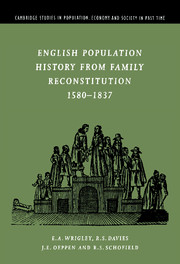Book contents
- Frontmatter
- Contents
- List of figures
- List of tables
- PART I
- PART II
- PART III
- APPENDICES
- 1 A list of the reconstituted parishes from which data were drawn and of the names of those who carried out the reconstitutions
- 2 Examples of the slips and forms used in reconstitution and a description of the system of weights and flags employed
- 3 Truncation bias and similar problems
- 4 Tests for logical errors in reconstitution data
- 5 Correcting for a ‘missing’ parish in making tabulations of marriage age
- 6 The estimation of adult mortality
- 7 Adjusting mortality rates taken from the four groups to form a single series
- 8 The calculation of the proportion of women still fecund at any given age
- 9 Summary of quinquennial demographic data using revised aggregative data and produced by generalised inverse projection
- 10 Selection criteria used in compiling the tables in chapters 5 to 7
- Bibliography
- Name index
- Place index
- Subject index
- Cambridge Studies in Population, Economy and Society in Past Time
4 - Tests for logical errors in reconstitution data
Published online by Cambridge University Press: 07 September 2010
- Frontmatter
- Contents
- List of figures
- List of tables
- PART I
- PART II
- PART III
- APPENDICES
- 1 A list of the reconstituted parishes from which data were drawn and of the names of those who carried out the reconstitutions
- 2 Examples of the slips and forms used in reconstitution and a description of the system of weights and flags employed
- 3 Truncation bias and similar problems
- 4 Tests for logical errors in reconstitution data
- 5 Correcting for a ‘missing’ parish in making tabulations of marriage age
- 6 The estimation of adult mortality
- 7 Adjusting mortality rates taken from the four groups to form a single series
- 8 The calculation of the proportion of women still fecund at any given age
- 9 Summary of quinquennial demographic data using revised aggregative data and produced by generalised inverse projection
- 10 Selection criteria used in compiling the tables in chapters 5 to 7
- Bibliography
- Name index
- Place index
- Subject index
- Cambridge Studies in Population, Economy and Society in Past Time
Summary
Physiology and social conventions may both set limits to the range of demographic phenomena, and therefore permit tests to be made on FRFs after their input into a machine-readable form. The tests are made in order to detect errors that may have been made either in the original process of reconstitution or subsequently, in the course of data input. As a result the quality and consistency of the data used in demographic tabulations is enhanced. The following tests were carried out on all the FRFs from the 26 parishes that form the empirical basis of this book.
On all individuals
1 That the date of birth was less than or equal to the date of baptism. Note that if the date of birth was not known directly from the register it was set equal to the date of baptism but given a weight, so that knowledge of the provenance of the information could be used as appropriate in subsequent tabulations.
2 That, similarly, the date of death was less than or equal to the date of burial. Here, too, if the date of death was not recorded in the register, it was set equal to the date of burial with the addition of a weight.
3 That the date of birth was less than or equal to the date of death.
4 That the date of death was less than the date of birth plus 105 years.
- Type
- Chapter
- Information
- English Population History from Family Reconstitution 1580–1837 , pp. 574 - 577Publisher: Cambridge University PressPrint publication year: 1997



